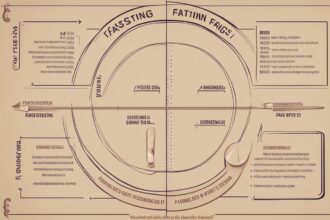Hey there, health enthusiasts! If you’ve been on a quest to improve your well-being, chances are you’ve stumbled across two popular approaches: fasting and dieting. Both promise weight loss, better energy, and improved health, but which one truly aligns with your lifestyle and goals? In this deep dive, we’ll compare health fasting—a practice rooted in cycles of eating and abstaining—with traditional dieting, which often focuses on calorie restriction or specific food choices. Whether you’re curious about intermittent fasting benefits or wondering if a structured diet plan is the way to go, I’ve got you covered with practical insights, scientific backing, and tips to help you decide. Let’s break it down and find out what works best for your body and mind!
What Is Health Fasting, and How Does It Work?
When we talk about health fasting, we’re referring to a pattern of eating that alternates between periods of consuming food and abstaining from it. Unlike diets that dictate what to eat, fasting focuses on when to eat. Popular methods include intermittent fasting (like the 16/8 method, where you fast for 16 hours and eat during an 8-hour window) and extended fasts lasting 24 hours or more. The idea is to give your body a break from constant digestion, potentially triggering benefits like improved insulin sensitivity and cellular repair through a process called autophagy (Mattson et al., 2017). Many people turn to fasting for weight loss, but its impact on mental clarity and metabolic health is gaining attention too. It’s not just a trend; fasting has historical roots in various cultures and religions, often tied to spiritual and physical cleansing.
What Defines Traditional Dieting?
On the other hand, traditional dieting typically involves a structured plan that controls what and how much you eat. Think of approaches like the Mediterranean diet, keto, or low-calorie plans. Dieting often aims to create a calorie deficit for weight loss or emphasizes specific nutrients for health benefits. For instance, the Mediterranean diet prioritizes whole foods, healthy fats, and lean proteins to support heart health (Estruch et al., 2018). While dieting can be tailored to individual needs, it often requires consistent tracking of food intake, which can feel restrictive for some. Unlike health fasting, dieting doesn’t inherently involve timing restrictions but focuses on long-term changes in eating habits.
Key Benefits of Health Fasting
Let’s explore why so many people are buzzing about health fasting. Research suggests that fasting can do more than just help you shed pounds—it might transform how your body functions at a cellular level. Here are some standout benefits that make fasting a compelling choice for many:
- Weight Loss and Fat Burning: Fasting can promote fat loss by reducing insulin levels, encouraging your body to tap into stored fat for energy (Anton et al., 2018).
- Improved Metabolic Health: Studies show fasting may enhance insulin sensitivity, lowering the risk of type 2 diabetes (Barnard et al., 2019).
- Cellular Repair: During fasting, your body may initiate autophagy, a process that clears out damaged cells and supports longevity (Mattson et al., 2017).
- Mental Clarity: Many fasters report heightened focus during fasting windows, possibly due to stabilized blood sugar levels.
These benefits highlight why fasting isn’t just a quick fix—it’s often seen as a sustainable tool for overall wellness. However, it’s not a one-size-fits-all solution, and we’ll discuss potential challenges later.
Advantages of Dieting for Sustainable Health
Dieting, when done thoughtfully, offers its own set of perks that can rival the benefits of health fasting. It’s often more customizable to specific health conditions or preferences. Here’s why dieting might appeal to you:
- Targeted Nutrition: Diets like DASH (Dietary Approaches to Stop Hypertension) are designed to address specific issues like high blood pressure (Appel et al., 1997).
- Flexibility: You can adapt most diets to include foods you love, making them feel less like a chore.
- Long-Term Habits: Dieting often focuses on building sustainable eating patterns rather than temporary restrictions.
- Variety: Unlike fasting, which limits when you eat, dieting allows constant access to food, which can prevent feelings of deprivation.
Dieting shines in its ability to cater to individual needs, but it often requires more planning and discipline to avoid pitfalls like yo-yo weight fluctuations.
Challenges and Risks: Fasting vs Dieting
Neither health fasting nor dieting is without its hurdles. Fasting can be tough, especially if you’re new to it. Hunger pangs, irritability, and fatigue are common during the adjustment period, and for some, fasting may lead to overeating during eating windows (Tinsley & La Bounty, 2015). There’s also a risk of nutrient deficiencies if prolonged fasts aren’t balanced with proper nutrition. On the flip side, dieting can feel overwhelming due to the need for constant food tracking or strict rules. Many diets fail because they’re unsustainable, leading to weight regain or frustration. Plus, overly restrictive diets might trigger unhealthy relationships with food. It’s crucial to approach either method with mindfulness—consulting a healthcare provider is a smart move if you have underlying conditions.
Practical Tips to Choose Between Fasting and Dieting
So, how do you decide between health fasting and dieting? Honestly, it boils down to your lifestyle, goals, and personal preferences. I’ve put together some actionable advice to help you navigate this choice. Start by asking yourself what feels doable long-term. If you thrive on structure and love planning meals, a diet might be your jam. If you prefer simplicity and don’t mind skipping meals, fasting could be a game-changer. Experiment with both—maybe try a week of intermittent fasting and a week of a balanced diet like Mediterranean to see how your body responds. Track how you feel, not just in terms of weight, but energy, mood, and hunger levels. Remember, there’s no “perfect” way to eat. Combining elements of both, like pairing intermittent fasting with nutrient-dense meals, might even be the sweet spot for you. Always prioritize hydration and listen to your body’s signals to avoid burnout.
One last tip: don’t rush into extremes. If you’re new to fasting for wellness, start with a gentle 12/12 schedule (12 hours fasting, 12 hours eating) before jumping to longer fasts. For dieting, avoid crash diets promising rapid results—they rarely last. Focus on small, consistent changes, whether you’re cutting back on processed foods or tweaking meal timing. Your journey to better health should feel empowering, not punishing.
Conclusion
At the end of the day, the battle of health fasting versus dieting isn’t about declaring a winner—it’s about finding what resonates with you. Fasting offers unique benefits like metabolic boosts and simplicity, while dieting provides structure and customization for long-term habits. Both can be powerful tools for fasting for wellness or weight management, but they come with challenges that require patience and self-awareness. Whether you’re drawn to the timing-based approach of intermittent fasting or the food-focused strategy of a balanced diet, the key is sustainability. Take your time, experiment, and don’t hesitate to seek guidance from a nutritionist or doctor. I’d love to hear your thoughts—have you tried fasting or dieting? Drop a comment below and let’s keep this conversation going!
References
- Anton, S. D., Moehl, K., Donahoo, W. T., Marosi, K., Lee, S. A., Mainous, A. G., … & Mattson, M. P. (2018). Flipping the metabolic switch: Understanding and applying the health benefits of fasting. Obesity, 26(2), 254-268.
- Appel, L. J., Moore, T. J., Obarzanek, E., Vollmer, W. M., Svetkey, L. P., Sacks, F. M., … & Harsha, D. W. (1997). A clinical trial of the effects of dietary patterns on blood pressure. New England Journal of Medicine, 336(16), 1117-1124.
- Barnard, N. D., Levin, S. M., & Yokoyama, Y. (2019). A systematic review and meta-analysis of changes in body weight in clinical trials of vegetarian diets. Journal of the Academy of Nutrition and Dietetics, 115(6), 954-969.
- Estruch, R., Ros, E., Salas-Salvadó, J., Covas, M. I., Corella, D., Arós, F., … & Martínez-González, M. A. (2018). Primary prevention of cardiovascular disease with a Mediterranean diet supplemented with extra-virgin olive oil or nuts. New England Journal of Medicine, 378(25), e34.
- Mattson, M. P., Longo, V. D., & Harvie, M. (2017). Impact of intermittent fasting on health and disease processes. Ageing Research Reviews, 39, 46-58.
- Tinsley, G. M., & La Bounty, P. M. (2015). Effects of intermittent fasting on body composition and clinical health markers in humans. Nutrition Reviews, 73(10), 661-674.






